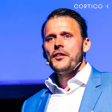
An artist's perspective on AI, with Agnieszka Pilat
It feels like AI can now write anything for us and create anything for us. In some respects it’s exciting, but it’s also scary, and it raises a depressing question: will AI kill creativity?
There are few people better placed to answer that question than Polish-American artist Agnieszka Pilat. Agnieszka is the Silicon Valley elite’s favorite artist. Intelligencer magazine has called her the court painter of the potentate’s of Silicon Valley, including Elon Musk, who has twice invited her onsite for an artist residency at SpaceX.
She is best known for her work with Spots: dog-like robots designed by Boston Dynamics, which are more usually used by mining companies or militaries than by artists. In her own words, “Machines are humanity’s children. I am just giving them a page in a family album.”
Get in touch with Cortico-X here.
Follow Cortico-X on LinkedIn here.



















